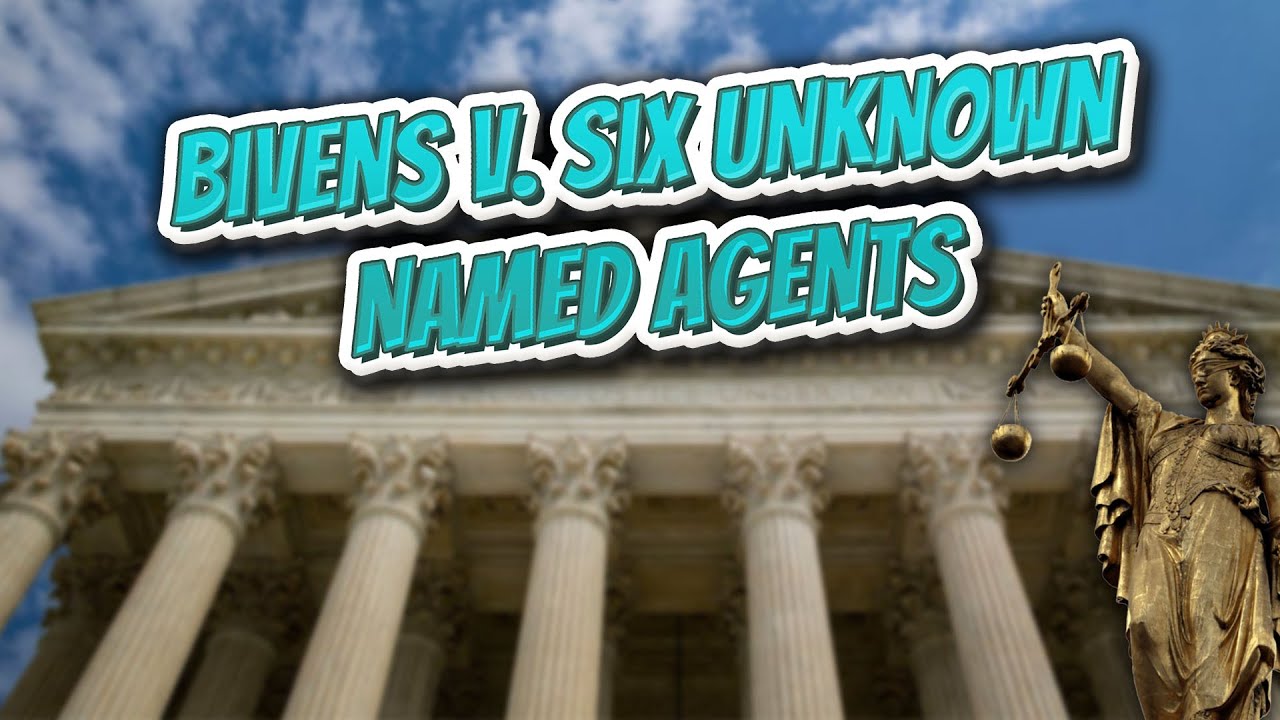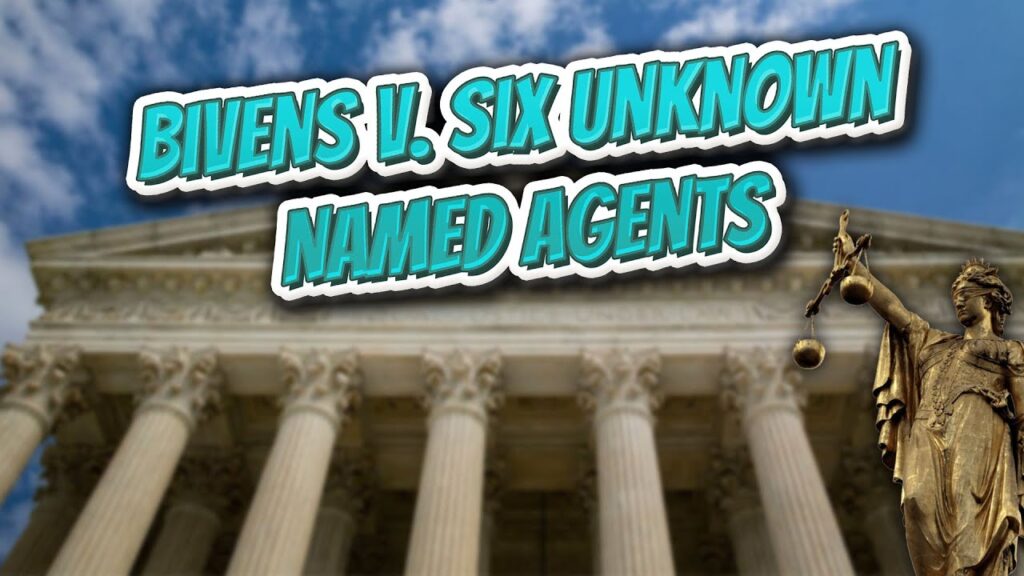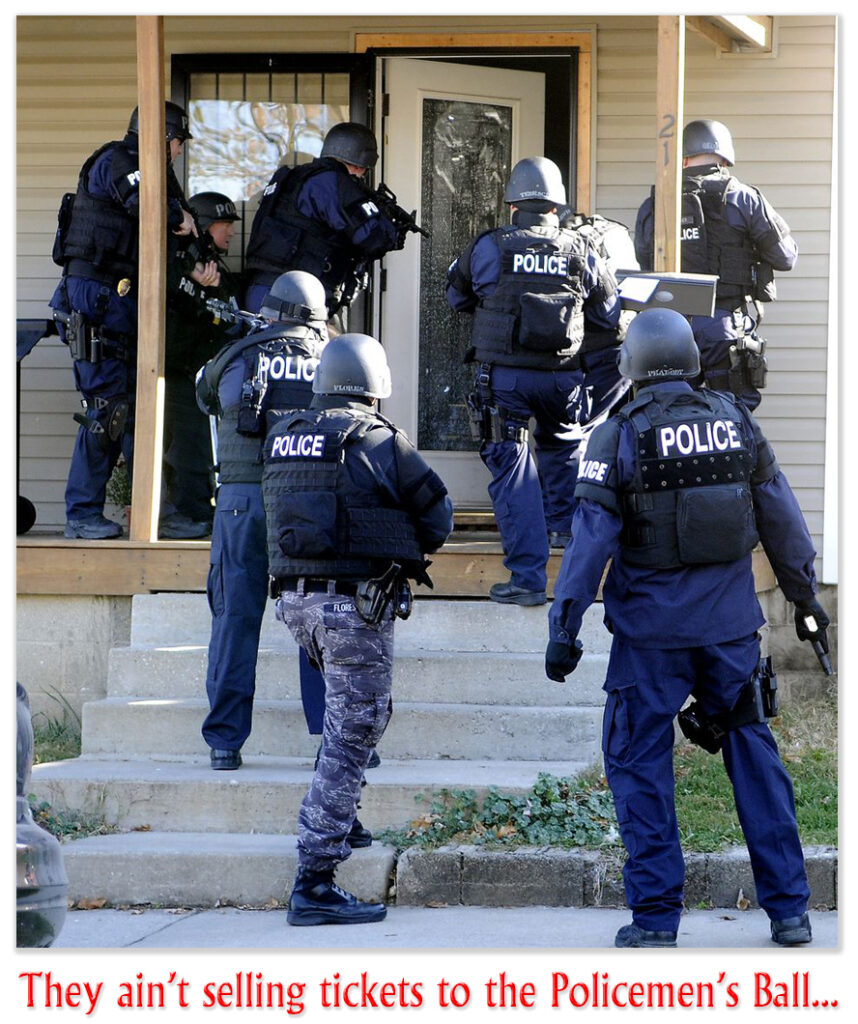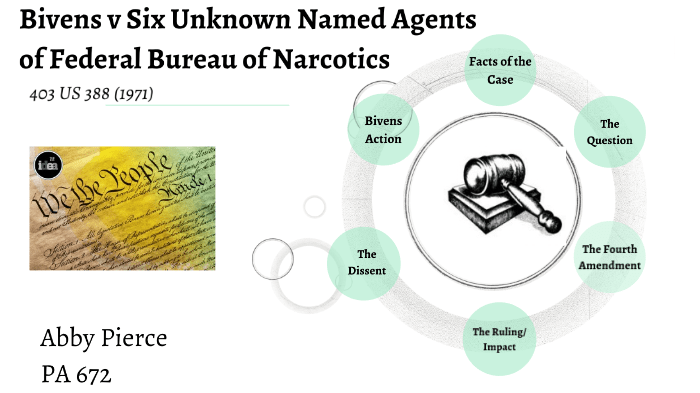Bivens v. Six Unknown Named Agents of the Federal Bureau of Narcotics
Bivens v. Six Unknown Named Agents, 403 U.S. 388, was a case in which the US Supreme Court ruled that an implied cause of action existed for an individual whose Fourth Amendment freedom from unreasonable search and seizures had been violated by the Federal Bureau of Narcotics.
Annotation
Primary Holding
Facts
Webster Bivens was arrested without a warrant when six agents from the Federal Bureau of Narcotics searched his house. After the U.S. Commissioner in the case dismissed the drug charges, Bivens claimed that the agents had violated his Fourth Amendment protections against unreasonable searches and seizures. The main issue was whether the Fourth Amendment offered a private cause of action, or whether Bivens’ sole remedy was a state law injury claim based on his right to privacy.
At the trial level, the federal district court dismissed the case on the grounds that Bivens had only a claim under state law, and the Second Circuit affirmed the decision. The Supreme Court thus reviewed the decision not on the substantive merits of whether his rights were violated, but to determine whether such a claim was even appropriate to bring in federal court.
Attorneys
- Stephen A. Grant (plaintiff)
Opinions
Majority
- William Joseph Brennan, Jr. (Author)
- William Orville Douglas
- Potter Stewart
- Byron Raymond White
- Thurgood Marshall
Brennan found that the absence of any federal remedy for the violation of a constitutional right could not be contemplated because every wrong must have a remedy. Therefore, he found it possible to infer a private right of action for damages even when it was not expressly provided. Brennan did leave open an exception when Congress has specifically provided that there may be no such cause of action, or when there are certain circumstances that would make a court reluctant to infer it, although he did not define what those circumstances might be. Broadly speaking, however, the majority opinion issued a clear rule that federal courts may award damages for any violations of constitutionallly protected interests by using traditional remedies such as money damages.
Dissent
- Hugo Lafayette Black (Author)
Black was largely concerned with burdening the already busy federal courts by expanding the range of cases that they could hear.
Concurrence
- John Marshall Harlan (Author)
In furtherance of the majority’s conclusions, Harlan pointed out that federal courts could issue injunctions for violations of constitutional rights. Money damages typically have been considered a less drastic remedy than injunctions, so it was logical to think that the courts could award them if they could award a more significant remedy. This concurrence also stated that constitutional rights are some of the most important that an individual can have, so it is particularly critical to give citizens the power to enforce them.
Dissent
- Harry Andrew Blackmun (Author)
Blackmun agreed with Black and felt that this ruling would spawn a dramatic expansion of claims in federal court.
Dissent
- Warren Earl Burger (Author)
Raising separation of powers concerns, Burger voiced anxiety that the Court had stepped into the legislative role by departing too far from the Constitution’s text.
Case Commentary
U.S. Supreme Court
Bivens v. Six Unknown Fed. Narcotics Agents, 403 U.S. 388 (1971)Bivens v. Six Unknown Named Agents
of Federal Bureau of Narcotics
No. 301
Argued January 12, 1971
Decided June 21, 1971
403 U.S. 388
Syllabus
Petitioner’s complaint alleged that respondent agents of the Federal Bureau of Narcotics, acting under color of federal authority, made a warrantless entry of his apartment, searched the apartment, and arrested him on narcotics charges. All of the acts were alleged to have been done without probable cause. Petitioner’s suit to recover damages from the agents was dismissed by the District Court on the alternative grounds (1) that it failed to state a federal cause of action and (2) that respondents were immune from suit by virtue of their official position. The Court of Appeals affirmed on the first ground alone.
Held:
1. Petitioner’s complaint states a federal cause of action under the Fourth Amendment for which damages are recoverable upon proof of injuries resulting from the federal agents’ violation of that Amendment. Pp. 403 U. S. 390-397.
2. The Court does not reach the immunity question, which was not passed on by the Court of Appeals. Pp. 403 U. S. 397-398.
409 F.2d 718, reversed and remanded.
BRENNAN, J., delivered the opinion of the Court, in which DOUGLAS, STEWART, WHITE, and MARSHALL, JJ., joined. HARLAN, J., filed an opinion concurring in the judgment, post, p. 403 U. S. 398. BURGER, C.J., post, p. 403 U. S. 411. BLACK, J., post, p. 403 U. S. 427, and BLACKMUN, J., post, p. 403 U. S. 430, filed dissenting opinions.
Page 403 U. S. 389
https://supreme.justia.com/cases/federal/us/403/388/#tab-opinion-1949368
download case PDF





